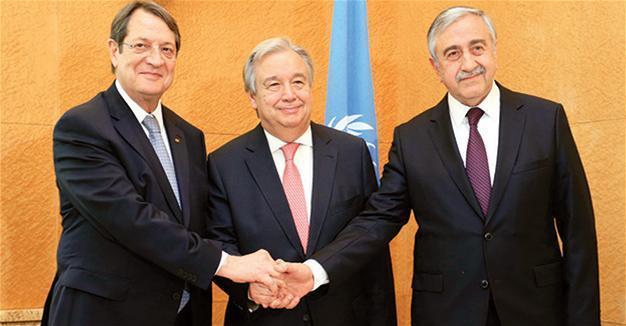Cautious Ankara sets 3 conditions for Cyprus
ISTANBUL/GENEVA
 Turkey has set three conditions regarding security, land tradeoffs and a rotating presidency to achieve a solution on Cyprus, Turkish President Recep Tayyip Erdoğan said Jan. 13, one day after a five-party conference over Cyprus ended without agreement but with a plan for officials to reconvene on Jan. 18 to tackle the thorny question of security.
Turkey has set three conditions regarding security, land tradeoffs and a rotating presidency to achieve a solution on Cyprus, Turkish President Recep Tayyip Erdoğan said Jan. 13, one day after a five-party conference over Cyprus ended without agreement but with a plan for officials to reconvene on Jan. 18 to tackle the thorny question of security.According to Erdoğan, the Turkish Cypriots “are working intensely and bringing sincerity” to the table, but the Greek Cypriots and Athens “still have different expectations.”
As part of the three conditions for a solution, Erdoğan reiterated that the Turkish side had said the Greeks should not expect a guarantee without Turkey, adding that a full withdrawal of Turkish troops was “out of the question.”
Greek Cypriot President Nicos Anastasiades, on the other hand, said on Jan. 13 that any deal to reunify Cyprus must include the withdrawal of the 30,000 Turkish troops from the island.
Erdoğan said Turkey and Greece could keep the previously agreed similar number of soldiers on the island, that is, 950 Greek troops to 650 Turkish troops.
Commenting on demands that all Turkish troops be withdrawn from the island, Erdoğan said, “If such a thing is being thought of, then both of the sides need to pull all of their soldiers from here.”
Stating that the Geneva peace talks were a new negotiation process separate from the 2004 Annan Plan, Erdoğan said Morphou and Erenköy (Kokkina) could be joined and left to the Turkish Cypriot side, while the whole of Famagusta, including Varosha, could be left to the Greek Cypriots.
As the last clause, Erdoğan said a rotating presidency in which the Turkish Cypriots would hold the post one time for every four times that it is held by the Greek Cypriots was unfair, noting that the ratio should be one-to-two.
Erdoğan’s comments came a day after the three guarantor powers of the island, Turkey, Greece and the United Kingdom, joined Anastasiades and Turkish Cypriot President Mustafa Akıncı at a five-party conference in Geneva on Jan. 12.
Working group to meet on Jan 18
The members of the five-party conference will meet again on Jan. 18 at a working group level represented by deputies to again examine the security question, before a fresh attempt to forge a complete political deal.
U.N. Secretary-General Antonio Guterres told Reuters that he was confident that the participants in the talks were determined to make a “last effort” to find a solution.
There was no precise date set for the guarantors of the process to meet again, but officials said they would reconvene once the sides had consolidated their positions.
Greek Foreign Minister Nikos Kotzias said the three foreign ministers of the guarantor powers would meet again on Jan. 23 to discuss the issue.
Foreign Minister Mevlüt Çavuşoğlu, however, dismissed any meeting on Jan. 23, saying: “The announcement of a date [by Kotzias] before reaching an agreement is not the right method.”
“The discussions today underscored the participants’ intention to find mutually acceptable solutions on security and guarantees that address the concerns of both communities,” a U.N. statement said.
“They recognized that the security of one community cannot come at the expense of the security of the other. They also acknowledged the need to address the traditional security concerns of the two communities while at the same time developing a security vision for a future united federal Cyprus,” it added.
No quick fix, says Guterres
Guterres had earlier warned that there could be no “quick fix” in the rift.
The parties are trying to reach a security deal on the presence of Turkish forces on the island in tandem with political negotiations on a comprehensive federal settlement sought by islanders.
While the Greek Cypriots want the guarantor system dismantled because of Turkey’s intervention in 1974 after a coup aimed at unification with Greece, Turkish Cypriots, targeted by Greek Cypriot nationalists before the war, want it maintained.
“Our position on this matter, and the Turkish Cypriot side’s position, is the same. The guarantorship of Turkey and the existence of Turkish soldiers on the island will continue,” Çavuşoğlu, who represented Ankara at the five-party conference in Geneva on Jan. 12, told reporters.
“This is an indispensable demand of the Turkish Cypriot people and the most sensitive issue for them,” he added.
















